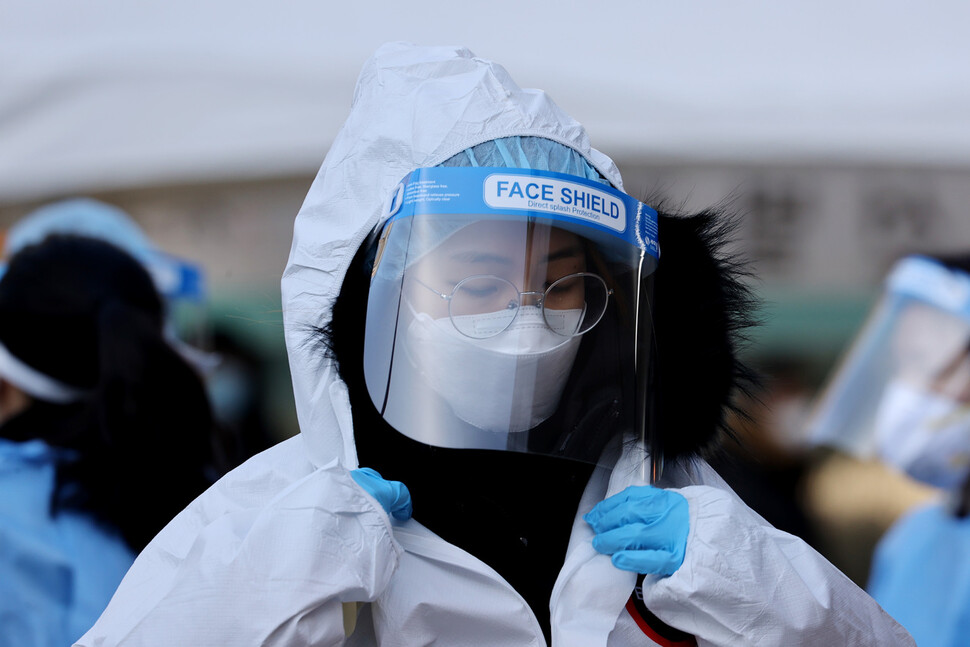
On the afternoon of the 25th, when the number of new corona19 confirmed cases was the largest in history, medical staff are wearing protective clothing at a temporary screening clinic in Seoul Plaza. yunhap news
The spread of the third epidemic is getting stronger, with the number of new corona19 confirmed cases in Korea being the largest in history. There is growing pressure to raise the social distancing stage to three, but the government is showing a reserved attitude. Whether or not to raise the 3rd stage is scheduled to be decided at the Central Safety Disaster Countermeasure Headquarters meeting on the 27th. The Central Defense Response Headquarters (Bangdaebon) announced on the 25th that there were 1241 new cases of Corona 19, of which 1216 were in Korea. This is the first time that the number of new confirmed cases has risen to 1200. Over the past week, the average number of confirmed cases in Korea per day reached 1005.9, exceeding the upper limit of the three-stage social distancing level (800 to 1,000 people nationwide). The proportion of patients with’unknown infection route’ who cannot know when and where they were infected is also close to 28%. Group infection is increasing in various areas such as medical institutions, nursing facilities, religious facilities, and workplaces. In the group infection that occurred in the eastern detention center in Seoul, an additional 288 people were confirmed that day, and the cumulative confirmed number reached 514. In food stores and restaurants in Cheonan, Chungcheongnam-do, 32 additional people were confirmed after the first confirmed case on the 23rd. Regardless of the epidemiological connection, 121 confirmed cases were also conducted at the temporary screening clinic installed in the metropolitan area so that anyone can undergo the test. However, the government’s attitude does not give much significance to the outbreak of 1,200 new confirmed cases. At the main script briefing that day, Tae-ho Yoon, head of quarantine at the Central Accident Recovery Headquarters (heavy water version), said, “The biggest reason for the sudden increase in the number of confirmed cases was that 288 confirmed cases appeared in the eastern detention center in Seoul.” It is maintained at the level of 900~1000 people who do not deviate.” “Because the eastern detention center in Seoul is already managed within the quarantine network, it is not spreading further to the local community,” he added. In the same vein, he said that the average number of confirmed cases in Korea per week exceeded 1,000, “it is likely to be a temporary phenomenon.” The steps of 2.5 and the second step of national distancing in the Seoul metropolitan area, which are currently in effect, will end on the 28th, and the government will decide what actions to take at the script meeting on the 27th. However, as long as the outbreak of 1,200 new confirmed cases is regarded as a “temporary phenomenon,” the possibility of a third-stage upgrade is unlikely. Instead, the government is looking forward to the’special quarantine measures for the year-end and New Year’ that will be implemented until January 3rd. Sohn Young-rae, head of the Strategic Planning Division of Heavy Soo-bon, said, “How the effect of special quarantine measures during the year-end and New Year will be revealed (for the decision to raise the 3rd stage), and whether quarantine response capabilities and medical capabilities can (follow the trend of spreading) are important. He said, “Please refrain from contacting and meeting during the period of special quarantine measures, and help the people so that the trend of proliferation can be turned into a decreasing phase.” However, experts pointed out, “We must not postpone the upgrade to the third stage, which has already missed the period.” Professor Hong Yoon-cheol of Seoul National University College of Medicine (preventive medicine) said, “The stage to talk about in each case, such as the eastern detention center, has already passed, and group infections are scattered nationwide.” I have to do it now.” Eom Joong-sik, a professor at Gachon University’s Gil Hospital (infectious medicine department), pointed out, “It is difficult to reduce the overall epidemic with tinkering such as’tweezers quarantine,’ and the effect will inevitably appear more slowly as the three-step upgrade measures are delayed and implemented.” By Choi Won-hyung, staff reporter [email protected]
